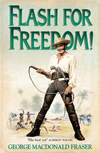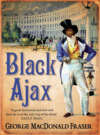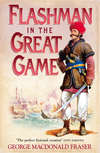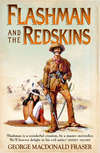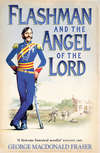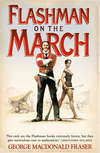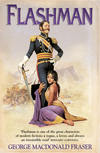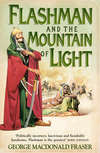Читать книгу: «The Pyrates», страница 2
All round, they were a happy little gang of eccentric cut-throats who crouched in the shadows under Fort St Bartlemy’s massy walls that balmy tropic night, waiting for the word from Rackham – and then they were storming up the passage, yelling bloody murder, while sleepy sentries above fired futile warning shots and ran about with their muskets at the high port. By then the pirates were slicing up the guards at the strong room, forcing the door, bursting open the first chest in a cascade of gold coin, into which Firebeard, exploding all over the place, threw himself bawling:
“It’s the dollars! A bloody fortune! Har-har! Calico! Sheba! Bilbo! We’m rich!” He always shouted this on taking a prize, whatever its value, while his fire-crackers set his hair ablaze and those nearest choked and spluttered. A tiny Welsh pirate crouched by the open chest, eagerly counting the coins: “One, two, three …” until someone yanked him aside.
Up in the commandant’s room they were exclaiming and belching and grabbing up their wigs and over-turning chairs, and shouting useful things like: “Pirates!” and “The paychests!” and “Sound the alarm!” and “Goose me wi’ a handspike, we’m beset!” and by the time they tumbled downstairs all hell was breaking loose. The pirates were bearing out the treasure-chests under Rackham’s directions, while Bilbo, firing his pistols with an elegant air and tossing them to his dwarf for reloading, was commanding the covering party who were at grips with the belated redcoats. It was desperate work, what with shots banging in the enclosed space, and powder-smoke everywhere, and pirates cursing as they were wounded, and redcoats falling down obligingly when they were shot, and Bilbo fleering and shooting, and Black Sheba leaping like a leopard, skewering with deadly daintiness, and Firebeard bashing and bawling. The commandant rallied his men with cries of “Blister me!” and blundered bravely ahead, crossing swords with Sheba over a couple of fallen bodies. He thrust clumsily at her chest … and paused, shaken, as he realised that his target, instead of being a conventional masculine torso, was more like something painted by an enthusiastic Rubens, and bouncing most distractingly to boot.
“Sink me, it’s a woman!” he concluded loudly. “Strike me speechless!” he added, which was prophetic, for:
“With pleasure!” hissed Sheba, and glided in like a dancer, perfect teeth bared in an unholy smile, and the commandant tripped and fell flat on his back. A high heel pinned him as she flicked aside his hat with her rapier point, whispering “Doff, dog – doff to a lady!” and the last thing the commandant knew was that black face mocking down at him and a tearing pain in his throat.
The soldiers fell back, appalled, and as the last of the chests was borne down the passage Rackham roared his followers back and away. They retreated, firing, down the great stone tunnel, while Sheba, the blood-lust on her, slashed and stabbed and laughed, with Firebeard beside her swinging his cutlass roaring “Take that, ye lousy lobster! Kill ’em! Tear ’em! Kill the honest men!” and Bilbo carefully shot an officer in the shoulder, and turned to supervise the stowage of the chests in the waiting longboats. Shepherding his men, Rackham looked back along the shambles of the tunnel, to see Sheba alone, fronting the disheartened soldiery, flourishing her rapier and screaming:
“Come on, you King’s men! Fight! Is one woman too many for you, you mangy cowards? Fight – that’s what they pay you your shilling a day for!”
And it’s not enough, either, was the universal thought among the military as they faced that black and crimson fighting fury; but the wounded officer tugged at a lever in the wall, and above Sheba’s head, through a slit in the stone, a great portcullis gate came swishing down. Too late Rackham cried a warning, too late she saw and sprang back; the great steel frame fell to divide the corridor from wall to wall, and although Sheba snaked beneath it to the seaward side, it pinned her ankle cruelly to the floor, and she lay trapped and helpless, her face contorted in agony, her rapier clanging on the flags. The pirates, with appropriate oaths, ran back to help; Firebeard strained his mighty thews in a vain effort to raise the portcullis, roaring “Heave, ye maggots!” and getting back the usual excuses, like “’Tain’t no manner o’ use we heavin’, cap’n, look’ee, she’m caught, like, an’ us can’t shift the bugger no-how!”
Meanwhile the soldiers, encouraged by the fact that there was now a stout steel gate between them and the pirates, surged foward, shooting; one even rushed up and tried to bayonet the fallen Sheba through the bars. But Bilbo snapped an order, the dwarf Goliath sprang to the bars like a monkey, through them went his wooden leg, and out of it shot a steel blade to drink the soldier’s heart’s blood. (Full of tricks, those pirates were.) But Sheba, writhing on the flags, was fast as ever, and as the others banged away overhead, Rackham knelt beside her.
“It’s no use, camarado! We can’t shift it! D’ye want to go quick, girl?” For garrison reinforcements were crowding down the tunnel, and Rackham looked to the priming of his pistol.
“Leave me!” gasped Sheba. “Each takes his chance … law of the Brotherhood!”
Firebeard, of course, was having none of that; he was a proper pirate, after all.
“We’ll fight it out, by the powers!” he bellowed. “I don’t leave no mess-mate in the lurch, by cock, burn damn and blast me if I do!” And he beat his fists on his chest.
“Balls!” cried Bilbo, forgetting his affectations in the heat of the moment. “She’s right! If we linger, we are undone! Anyway, we’ve got the loot! Shove off!” No nonsense about Bilbo; he strode to the sea-steps, and the long-boats surged into the night, heavy with the booty. Several pirates dragged Firebeard into the last boat, heedless of his bawling: “We can’t leave her! Let’s cut off her leg!,” and for a brief moment, with the last pirates on the steps keeping the soldiers at a distance with their pistol fire, Rackham was left alone by the pinned and helpless woman.
“Go, Calico! Quickly!” she gasped, and the big man stared down at her with tears in his eyes, and stooped to kiss her brow.
“I’ll be back for you, camarado! Wherever they take you – we’ll get you out!”
And then he was gone, springing down the steps to the last boat, and it shoved off into the darkness, with the pirates singing “Fifteen men on the Dead Man’s Chest,” which is not actually a very good song to row to; consequently they caught crabs all over the place, and wallowed in a welter of gold coins and bilge-water and rum, with the boats bucketing about. The redcoats on the battlements should have picked them off easily, but as everyone knows, in such circumstances redcoats never hit anything, but pop off their blanks in a most desultory fashion.
But while the pirates eventually regained their ship, the soldiers in the tunnel were bearing down triumphantly on the slim crimson figure pinned beneath the portcullis; Sheba cast one agonised glance after her departing comrades, choked on tears of pain, gnashed out a truly disgusting oath at her enemies, and then lapsed gracefully into a swoon. The wounded officer, clutching his shoulder, ordered the portcullis raised, and kicked the insensible figure cruelly in its shapely ribs, snarling: “We’ve got this heathen slut, at any rate! Gad, but we’ll make her pay for this …”
Which is a suitably dramatic moment to bring this first chapter to a close, with the powder-smoke a-reek in our nostrils, our principals introduced, and Delectable Dusky Villainy in the clutches of the law. What will the brutal beastly soldiery do to Black Sheba? Will they …? What of Rackham’s promise to save her? Does Bilbo even care? And what has all this got to do with the handsome Captain Avery and the rascally Colonel Blood? We shall e’en see in Chapter the Second.
CHAPTER
THE SECOND
In fact, while Sheba was languishing decoratively in her chains in the grim dungeon of Fort St Bartlemy, having beaten off the advances of her leering jailers till her arms ached, and her pirate shipmates were falling about in drunken celebration singing “Mouths were made for tankards and for sucking at the bung,” while their ship headed erratically towards Tortuga with the loot, Captain Avery was bowing gracefully – not too little, not too much, but just right – on the threshold of Mr Pepys’s office at the Admiralty. And Mr Pepys, hurriedly adjusting the wig he had laid by, and guiltily shoving his Diary under some papers, could have done without him. For one thing, Pepys had been looking forward to neglecting the victualling estimates in favour of sneaking in a few fresh entries – he was itching to record the details about his fine new broadcloth coat, and the red-head who he was sure had winked in his direction at Drury Lane, and the curds and small beer he had had for breakfast, and his wife’s all-night card parties. But there it was in his appointment book: “Capn Everie, at 10 of the clock,” so he sighed and composed himself to receive his visitor.
Another reason for the Secretary’s discontent was that he was meeting Captain Avery for the first time, and suffering the common reaction to such masculine perfection. Nobody, decided Mr Pepys resentfully, had any business to go around looking like that; it made you feel positively sub-human. But there he was, like some naval tailor’s fashion model, announcing himself the Secretary’s humble obedient in a smooth, well-modulated tone that proclaimed him anything but; to Mr Pepys’s paranoid imagination he conveyed the impression that he had many more important things on hand – probably conferring with Dr Newton or Lord Clarendon – but that he was graciously prepared to give the Admiralty ten minutes provided they got on with it. Right, thought the normally amiable Pepys grimly, we’ll cut this one down to size. To which end he looked at his visitor severely over his spectacles and inquired:
“Captain Avery, are you an honest man?”
It didn’t work, of course. Far from being taken aback, Avery raised one brow a millimetre and replied, in a tone of gently amused tolerance:
“I am a gentleman, sir.”
Mr Pepys almost said “So’s the King, and look at him,” but fortunately refrained. Covering his chagrin by fiddling with the rigging of a ship’s model – his cosy little office was full of them, and globes and charts and waggoners and maps – he went on as amiably as he could:
“I ask, sir, because when I requested their lordships to find me a young officer for a desperate and confidential business, they told me that of all men, Captain Avery was the most capable, expert, brave, discreet, and intelligent gentleman in his majesty’s service.”
He paused, and gave up fiddling with the model’s mainsail, which was in a hopeless tangle. Avery said nothing, but took a deferential pace forward, twitched a thread, and the mainsail rose smoothly into place.
“Indeed, sir?” said he politely, and Mr Pepys ground his teeth.
“But they omitted to tell me whether you picked pockets,” he blurted out.
Captain Avery regarded him with maddening composure. “Is that the service you require, sir?” he wondered, and Mr Pepys took a grip on himself.
“No,” he said tartly. “It isn’t. I merely impress on you, captain, that I have a pocket that must not … be picked. See here.”
He touched a spring in the panelling, which slid back to reveal a cavity from which Mr Pepys took a box of polished oak, perhaps a foot square. Lifting the lid, he brought out an object covered in black velvet cloth, and set it on the desk. Then abruptly he pulled the cloth aside – and if that doesn’t rattle the cocky little bastard, he thought, nothing will. For what he exposed was an object so dazzling that Mr Pepys, who had seen it before, still found himself catching his breath in wonder.
It was a crown. Its dull radiance bespoke pure gold, but the circlet itself was so encrusted with tiny jewels that the metal beneath was all but hidden. Yet these stones, priceless though they were, seemed dim by comparison with the six great gems which shone in the six gold crosses fixed at equal intervals round the circlet. Each as large as a pigeon’s egg, they glowed in their golden settings – the rich crimson of a ruby, the eery green of an emerald, the brilliant blue of a sapphire, the milky white of an opal, the frosty brilliance of a diamond, and the ebony sheen of a black pearl. Blinking in awed silence at them, Mr Pepys felt his ill-temper vanish like summer dew, and he was gratified to see that the Captain’s eyes had opened a trifle and that his breathing checked for a brief instant.
“A pretty bauble, is it not?” said Pepys. “A million – if ye can imagine such a sum – would not buy it.”
“I hope,” said Captain Avery reverently, “that you have stout locks to your doors.”
“Stout enough to serve,” said Pepys lightly, and stole another glance at his visitor. “Could I trust you, captain, with this treasure?”
Captain Avery looked from the crown to the Secretary, regarding him gravely for a moment. “Yes, sir,” he said, “but I had rather you did not.”
So the paragon was human after all. Mollified, Mr Pepys smiled, covered the crown, and waved his visitor to a chair. “Do you know,” he wondered, “of an island called Madagascar?”
“The great isle of Africa,” said the Captain confidently, “lying betwixt the twelfth and twenty-fifth south latitudes, six hundred leagues bearing east-nor’-east from the cape. Of unknown extent, peopled by savage aborigines practising abominable rites, yet are its birds, fishes, animals and vegetation even stranger than its human inhabitants, being like to none other on the globe of Earth. Fable doth impute to it,” he went on, “such strange creatures as the roc, the great bird of the Eastern story-tellers, and Sir John Mandeville peopled it with his marvellous imaginings. I have not,” concluded Captain Avery modestly, “been there myself.”
“But ye’re sure ye’ve heard of it?” said Pepys sarcastically. “Well, God be thanked for that. Know then, sir, that this crown is for the king of that strange land, a mad, barbarous fellow who, in his vanity, hath sent the choicest gems o’ price in his treasury to our London goldsmiths, that they might therefrom fashion a diadem befitting his savage majesty his proud estate. These sambos,” reflected Mr Pepys, “do love to deck themselves more than do civil princes. Howbeit, there it is – now it must be returned to him. Safely. That, captain, is why y’are here.”
He sat back in impressive silence – it would have been more impressive but his belly chose that moment to rumble from a deep growl to a high bubbling treble. Mr Pepys writhed and damned curds and beer, but Captain Avery seemed not to have noticed. He wouldn’t, the good-mannered sod, thought Mr Pepys savagely. Ten seconds passed, and Avery nodded and stood up.
“I understand, sir,” he said briskly. “You may leave all to me. One stout naval brig under my command – I shall choose officers and crew myself – should answer the purpose … with a sufficient escort, of course. Two sloops should serve, so they are well found and manned. I think,” he added, “I had best attend to that. But let me see … six weeks to the Cape … two months … at Christmas, with God’s help,” he announced, “I shall be here to inform you that the business has been happily concluded.”
I can’t believe you’ll need God’s help, and if you do, he’d better not shirk, eh, thought Mr Pepys. He wondered had he ever seen the like of this coxcomb’s assurance; it seemed a pity to deflate it, almost.
“My dear captain,” he shook his head, “things are not ordered in such broadside fashion. Consider: the existence of this bauble is known. Goldsmiths have tongues, and if a King’s ship were to prepare for Indian waters, at a time when ships are ill to spare, and no good reason could be given – why, all the world would guess, and you and your cargo would be a target for every sea-thief between here and Malabar.” He popped the crown back into its box, locked it, and extracted the key. “No, here must be stealth and secrecy; only you and I and Admiral Lord Rooke, who goes shortly to command the East Indies Squadron, must know of the crown’s passage forth of England. So you shall bear it alone, and guard it with your life, for its safe delivery imports o’er all. You have not visited Madagascar, but out of your vasty fund of knowledge –” Mr Pepys beamed over his spectacles as he put the boot gently in “– you know how vital is the friendship of its ruler to our Indian trade. With his good will, we may set up stations in Madagascar, to shield our sea-lanes and harry the Utopian pirates who swarm on its northern capes. And his good will depends on …” he tapped the box with the key “… this.”
If Captain Avery was disappointed, he did not show it. He inclined his handsome head, and if a voice can shrug, his did as he said: “As you please, sir. Shall I take the box now?”
“Hold on a minute,” snapped Mr Pepys, who had been getting ready to enjoy overruling a protest. Could nothing shake this boy’s outrageous composure? (Of course not; this boy’s the Hero.) “There’s a receipt to sign,” he muttered lamely. “In triplicate.”
But there wasn’t, not right away, because Mr Pepys had mislaid it, and his temper was not improved at having to scrabble through his mess of papers while Avery stood by with an impassive patience which the Secretary, his wig slipping askew and his glasses misting up, found positively crucifying. He stood, breathing heavily, as Avery finally signed the three documents, in a flawless copper-plate, and took the box. Never mind, thought Pepys, we’ll see you taken down a peg in a minute, or I’ll eat this ruddy wig.
“Come with me,” he said, and led the way from his office down a long passage where sentries clicked to attention and clerks hurried busily between the departments. Captain Avery paced leisurely along, while Mr Pepys’s fat little legs went nineteen to the angry dozen, until they came out through a door into a sunlit garden, where ladies and gentlemen took their ease in the pleasant August morning, walking and flirting and playing pell-mell and generally looking like a pastoral scene by Canaletto, and Mr Pepys peered about short-sightedly until his glance lighted on two tall gentlemen strolling arm in arm along one of the walks. He gave a grunt of satisfaction, shot Captain Avery a look, and bustled in their direction.
The King and the Duke of York were taking their ease together, and the court was keeping its distance because it realised that his grace had just returned from Scotland and was undoubtedly filling in his majesty on matters of great pitch and policy. And indeed the younger royal brother was talking with animation, while the famous swarthy man two yards high, his spaniels round his feet, his beribboned cane in his hand, plumed hat and curled wig on head, and all magnificent in dark blue velvet, was listening with what appeared to be interested attention.
“’Twas at the short fourteenth,” the Duke was saying. “Need I tell thee what ’tis like? A hint of slice and you’re dead. I laid my pitch pin-high, and damme if Paterson didn’t miss the putt!”
“Codso!” exclaimed King Charles.
“By great good fortune, we halved the next two,” went on the Duke, “for I tell thee, brother, had I not held firm, all had not served. Paterson shanked and hooked, and I was sore put to it.”
“D’ye tell me?” marvelled his majesty, stifling a yawn.
“At the seventeenth,” resumed the Duke remorselessly, “all was to do, for Rockingham drove like Jehu, and Paterson’s second was sorrily astray. I marked it not, but took my brassie – ye mind, Charles, the brassie that Grandfather James had of the steward at Blackheath? – and struck me such a shot over the sheds as would ha’ done thy heart good to see. Ten score yards,” he murmured beatifically, “into the wind, and ran me down ’twixt the pits to the edge o’ the green. Rockingham cried, ‘The bugger!’ and my good Paterson ‘Amen!’”
“Gad’s wounds!” murmured the King absently, his eyes straying to where a Junoesque redhead was swaying provocatively along on the arm of an elderly nobleman.
“Then Paterson,” said the Duke darkly, “put his chip into a bunker. What think ye, brother, did I do?”
“Ten stone if she’s an ounce,” mused the King, “and forty-five to boot, so they tell me. Forgive me, James – you were saying?”
“I holed out from the sand,” said the Duke triumphantly, and following his brother’s glance he added curtly: “Danby’s new pullet, a great quilt of a woman. He likes ’em big and bouncy.”
“Don’t we all?” sighed the King.
“At the eighteenth …” the Duke was beginning, but realised he had lost even the King’s pretence of listening. “I see,” he said coolly, “that I weary your majesty. I crave your majesty’s pardon. It is very well. I shall remove, and take me –”
“Jamie, Jamie,” said the King tolerantly. “Ye beat the gentlemen of England two up, and had Paterson not hindered, t’would ha’ been eight and seven. I know,” he added mildly, “because ye told us last night at supper, till poor Nell dozed in her chair, and again at breakfast.” He laughed and clapped his glowering brother on the back. “Dear lad, ye play golf for Scotland indifferent well, but ye could bore for her in every court of Europe.”
“Right!” snapped the Duke, furiously pale, and breathing through his haughty nostrils. “’Tis very well! That did it! I bore for Scotland! When I consider,” he went on bitterly, “how often I’ve been dragged up that bloody oak tree after Worcester –” But he was prevented from further lésé majesté by the arrival of Mr Pepys, with Captain Avery in tow. The King hailed the Secretary pleasantly, and took stock of our hero while Pepys made the introductions.
“Captain Avery,” said his majesty genially, and held out his hand, over which the young captain bowed with becoming grace. “I’m glad to see ye, sir.” As always, he plainly meant it, and Mr Pepys looked to see Captain Avery fall under the spell of the famous Stuart charm; after all, everyone did. But Captain Avery merely stood up straight, respectful and composed, and it occurred to the Secretary that if a stranger from Muscovy had been shown the three – the two tall and undeniably handsome royal brothers, and the King’s captain – he might have been puzzled to know who had the most commanding personality and aristocratic air. This kid’s gunpowder, Pepys decided.
“Captain Avery,” he went on, “is the officer to be employed on the Indian business your majesty doth wot of.”
“Ah, yes,” said the Merry Monarch with polite interest, wondering what that business might be; wasn’t old Rooke going out to deal with the pirates … something like that? He played for time by reproving the tiny spaniels playing round his ankles. “Mind, Bucephalus, where you put your great feet. Their lordships, captain,” he went on, lying courteously, “have given me golden reports of you. Now tell me how old are you, and what service ye have seen.”
“Your majesty,” said Captain Avery respectfully, “is gracious. I am twenty-two years old, and have had the honour to serve your majesty these five years. Lately I commanded one of your majesty’s warships, and have fought ’gainst the Dutch, the French, the Spaniards, and the corsairs of Barbary, having the good fortune to take ten prizes and two fortresses, as well,” he added dismissively, “as three wounds. I am a bachelor of arts of Oxford, where I made some study of Mathematicks, Physicks, and the other Natural Sciences, tho’ less than I could have wished. If my service permits, I hope to repair that and take my Master’s Degree in time. Other than that,” he concluded, “there is little to tell.”
Mr Pepys was watching the royal pair to see how they received this catalogue, and was gratified to see the Duke blink; his majesty, more experienced, made a nice recovery.
“Physicks, eh?” he said. “Have you perchance, captain, studied Master Newton’s De Analysi, of which there is much learned talk?”
Try that on for size, thought Mr Pepys triumphantly; trust old Charley to return serve. He looked to see Captain Avery confess ignorance at last, and indeed the captain was frowning, his handsome face turned to the King’s.
“The method of fluxions,” he said gravely. “Indeed, sire, I have considered it briefly, but with indifferent profit on such short acquaintance. What is your majesty’s opinion of the calculus?”
Bloody hell, thought Pepys, and his majesty may have been similarly moved, since he had listened to Newton’s explanation in a fog, and had just been name-dropping. “Ah, well,” he said, improvising gamely, “there is much to be said for it; aye, indeed, and will be. But tell me, captain, what shall you make of these Indies pirates?”
Captain Avery looked surprised. “If such should come in my way,” he said, “I shall hope to do your majesty’s service upon them.”
“To be sure, to be sure,” said the King hurriedly. He was beginning to find such simple self-assurance daunting, especially from one who was two inches taller than he was. He wasn’t used to either phenomenon, and like Mr Pepys, was beginning to suspect that Captain Avery was too much of a good thing. But he mustn’t be hard on the lad; maybe it was just another case of meeting-royalty nerves.
“Well, well, captain,” he said heartily, “we wish you a prosperous voyage. Is there aught ye need?” he added almost hopefully.
“You majesty is kind,” said Avery, “but I have my sword and your majesty’s trust. I need no more.” And he bowed with deferential calm, leaving the King as disconcerted as it was possible for that sophisticated gentleman to be.
“No,” said the King, rather wistfully, “I don’t suppose you do. Aye, well.” He looked about helplessly, and became aware that his spaniels were busily chewing the rosettes on his shoes. “Stop it, you little bastards,” he said irritably.
“If your majesty pleases,” said Avery, and glancing at the dogs he gently snapped his fingers. As one spaniel they stopped chewing, and hid behind the King’s legs. The captain transferred his gaze from them to the astonished monarch, and bowed for the last time. “Your majesty, your grace, Mr Pepys,” he said, and backing gracefully away, turned and strode off across the lawn. They watched him go in a stunned silence, until his majesty murmured, almost in awe: “Well, God help the Indies pirates!” and sighed. And then their wonder changed to interest, for as Captain Avery reached the gravel walk, there swayed into his path the opulent red-haired beauty whom his majesty had remarked earlier on the arm of Lord Danby. She had, in fact, been eyeing the captain hungrily for the past five minutes, and thinking, wow! there’s a boy who needs an experience, and I’m going to be it. Subtle in all the amorous arts, she now undulated towards him, shooting him a smouldering glance from shadowed eyes, pouting seductively, and drawing a flimsy lace kerchief from her heaving bosom. She dropped it artlessly in the captain’s path, and he stopped, glanced at it, and at the heavily-breathing lady.
The King, the Duke of York, and Mr Pepys waited entranced; the lady sighed and fluttered her eye-lids; Captain Avery, his face impassive, glanced round, observed a serving-man, snapped his fingers, and indicated the fallen kerchief. The servant shot forward to retrieve it, Captain Avery indicated the lady, gave her the briefest of bows, and strode majestically on, leaving Beauty fuming in frustration and Royalty looking at each other in astonishment.
“That fellow,” said the King in wonder, “is just a walking mass of virtue and genius. Rot me,” he added, “if he isn’t. Well, thank God he’s going to the Indies, for if he stayed here he’d make us feel mightily inferior.”
“What’s a fluxion?” asked the Duke of York, but if the King answered, Mr Pepys did not hear it; he had become suddenly conscious that he was chewing the end of his wig.
As it chanced, Captain Avery’s departure was less speedy than his majesty had supposed. He was to travel out with Admiral Lord Rooke, the new commander of the East Indies Squadron, but his lordship had the misfortune to trip over a chamberpot at a wayside in while travelling up to Town, and broke his ankle. So while the veteran salt convalesced, roaring at the doctors and being reproved by his domineering daughter (who suspected, quite rightly, that he had been tight), Captain Avery kicked his perfectly-shod heels in London for over a month. This entailed returning his precious cargo to the Admiralty for the moment, and since Pepys had lost the receipts, there was wrath and bad language, not lessened by Captain Avery’s maddening forbearance. At last, however, all was ready; word came that Lord Rooke was on his way, Avery collected the Madagascar crown again, and on that very day, two interesting events occurred in the great city …
Deep in a noisome hold in Newgate Prison, Black Sheba was pacing the slimy floor like a great cat, her fetters jangling as she strode. She was in a passion, and no wonder. We left her resisting the advances of horrid jailers at Fort St Bartlemy, remember; it might have gone ill with her womanhood there, for the garrison had remarked her beauty, and hung around outside her cell muttering and slavering: “Ar, a choice black pullet it be, a plumptious piece for lovesome sport an’ ravishment, mates, har-har!”, but fortunately the senior surviving officer at the fort was a fairy, and wasn’t having any of that sort of thing. Scenting publicity for himself in the capture of the notorious pirate virago, he had sent her home by fast frigate, and she had lain like a great black beast in the foul lazarette, eyes gleaming in the dark, fed on slops, her fine silk attire reduced to rags – she was in a sorry state of unkemptitude by the time they brought her ashore in the Pool, and thence she was haled to Newgate, where they made a show of her, with fashionable society flocking to see the savage sea queen caged at last. Fine ladies smirked and gloated, and their gentlemen stared and thought “Cor!” while Sheba watched them from behind her bars with red sparks glowing in her amber eyes, and dreamed of them suffering torments indescribable.
Бесплатный фрагмент закончился.












